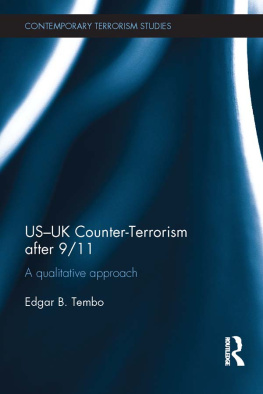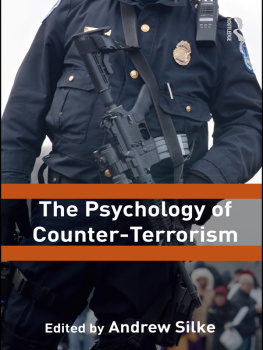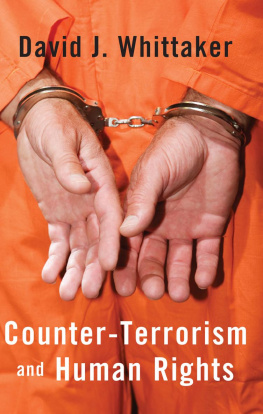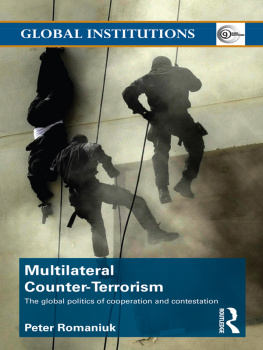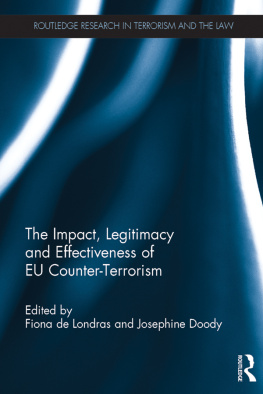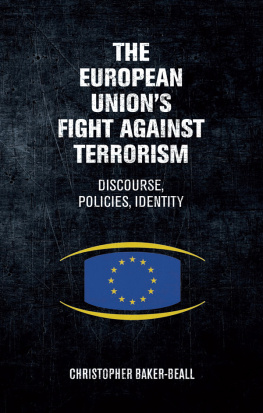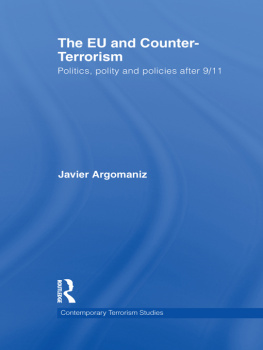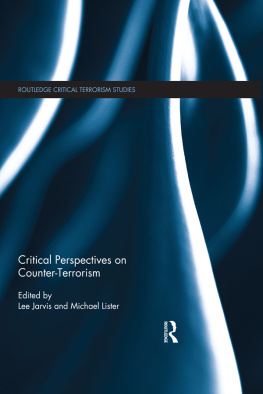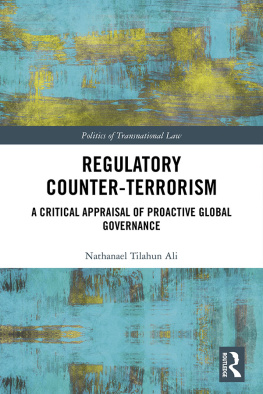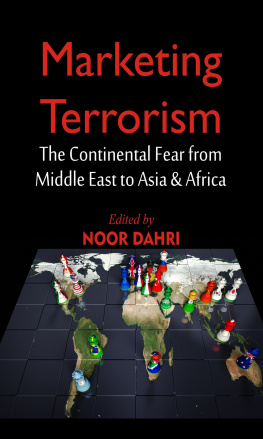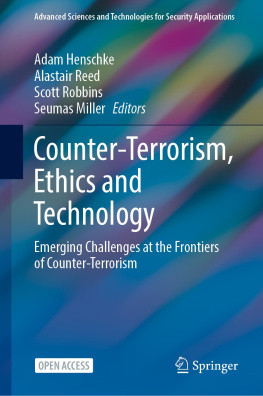US-UK Counter-Terrorism after 9/11
This book provides a qualitative analysis of post-9/11 counter-terrorism strategy undertaken by the United Kingdom and United States of America.
Since 9/11, both the UK and the US have significantly revamped their counter-terrorism approaches. The approaches apply, to varying degrees, three key policy instruments intelligence, law enforcement and military force. However, the success or failure of these counter-terrorism strategies has never been satisfactorily validated. Analysts and policymakers alike have assumed their success due to the inability of terrorists to conduct 7/7 and 9/11, respectively, scale attacks upon each state. This assumption has existed despite the fact that it fundamentally underestimates the impact of transnational terrorism.
This volume provides an in-depth qualitative assessment of the three primary policy instruments implemented to counter the transnational threat of terrorism during the period 20012011; an approach somewhat neglected by the current body of literature which utilises primarily a quantitative methodology. Drawing upon previously unpublished data collected from interviews with policymakers, specialists and academics, this book fills this lacuna by ascertaining and analysing both UK and US counter-terrorism strategies and based upon this examination providing policy recommendations for both states.
This book will be of interest to students of terrorism and counter-terrorism studies, security studies and IR in general.
Edgar B. Tembo is a Lecturer at Sheffield Hallam University, UK.
Contemporary Terrorism Studies
Understanding Terrorist Innovation
Technology, tactics and global trends
Adam Dolnik
The Strategy of Terrorism
How it works, why it fails
Peter Neumann and M.L.R. Smith
Female Terrorism and Militancy
Agency, utility, and organization
Edited by Cindy D. Ness
Women and Terrorism
Female activity in domestic and international terror groups
Margaret Gonzalez-Perez
The Psychology of Strategic Terrorism
Public and government responses to attack
Ben Sheppard
The De-Radicalization of Jihadists
Transforming armed Islamist movements
Omar Ashour
Targeting Terrorist Financing
International cooperation and new regimes
Arabinda Acharya
Managing Terrorism and Insurgency
Regeneration, recruitment and attrition
Cameron I. Crouch
Religion and Political Violence
Sacred protest in the modern world
Jennifer L. Jefferis
International Terrorism Post-9/11
Comparative dynamics and responses
Edited by Asaf Siniver
Talking to Terrorists
Concessions and the renunciation of violence
Carolin Goerzig
Freedom and Terror
Reason and unreason in politics
Abraham Kaplan and Gabriel Weimann
Evaluating Counterterrorism Performance
A comparative study
Beatrice de Graaf
The EU and Counter-Terrorism
Politics, polity and policies after 9/11
Javier Argomaniz
The Evolution of EU Counter-Terrorism
European security policy after 9/11
Raphael Bossong
Conducting Terrorism Field Research
A guide
Edited by Adam Dolnik
USUK Counter-Terrorism after 9/11
A qualitative approach
Edgar B. Tembo
US-UK Counter-Terrorism after 9/11
A qualitative approach
Edgar B. Tembo
First published 2014
by Routledge
2 Park Square, Milton Park, Abingdon, Oxon OX14 4RN
and by Routledge
711 Third Avenue, New York, NY 10017
Routledge is an imprint of the Taylor & Francis Group, an informa business
2014 Edgar B. Tembo
The right of Edgar B. Tembo to be identified as author of this work has been asserted by him in accordance with sections 77 and 78 of the Copyright, Designs and Patents Act 1988.
All rights reserved. No part of this book may be reprinted or reproduced or utilised in any form or by any electronic, mechanical, or other means, now known or hereafter invented, including photocopying and recording, or in any information storage or retrieval system, without permission in writing from the publishers.
Trademark notice: Product or corporate names may be trademarks or registered trademarks, and are used only for identification and explanation without intent to infringe.
British Library Cataloguing in Publication Data
A catalogue record for this book is available from the British Library
Library of Congress Cataloging-in-Publication Data
Tembo, Edgar B.
USUK counter-terrorism after 9/11 : a qualitative approach / Edgar B. Tembo.
pages cm. (Contemporary terrorism studies)
Includes bibliographical references and index.
1. TerrorismUnited StatesPrevention. 2. TerrorismGreat Britain Prevention. 3. War on Terrorism, 20012009. 4. September 11 Terrorist Attacks, 2001Influence. I. Title.
HV6432.T424 2013
363.325170941dc23
2013027603
ISBN: 978-0-415-64378-8 (hbk)
ISBN: 978-0-203-07999-7 (ebk)
Typeset in Times
by Wearset Ltd, Boldon, Tyne and Wear
Contents
It is of course apt that I should thank the University of Sheffield, particularly the Department of Politics and the Graduate Research Centre, for providing the guidance, time, space, and through a University Scholarship funding to undertake the research that informs this work. I would also like to thank the editorial team at Routledge, particularly Annabelle Harris and my anonymous reviewers, for their informed and timely comments on early drafts. It goes without saying that any errors are completely my own.
Critical to the viability of the work were my interviewees, some of whom, for obvious reasons, are not identified here. Interviewees came from both the United Kingdom and the United States, working at all levels of government, law enforcement, intelligence and military force. Without them, their time and their trust, this work simply would not have been possible. I am eternally grateful.
The commissioning of a research-based, single-authored monograph is not only time consuming but emotionally draining. It is my friends and family that have supported me and for whom the greatest amount of thanks is reserved. Many perhaps do not realise how valuable their presence be it via email, on the phone or in person has been. Of particular note are those who acted as informal proofreaders and critics at various stages of my research. Nicholas Hyman, Andrea Sterling and of course Mum. From the bottom of my heart I thank you.
Last but not least, and to whom this book is dedicated, I would like to thank all those who I have had the pleasure of teaching at the University of Sheffield (20072011), University of Nottingham (20112012) and Sheffield Hallam University (20122013). There is no greater joy then being party to the learning process of young, fertile minds. It is, however, a two-way street. Many of you have, without knowing it, helped me finesse many of the arguments and rationales that appear in this work.
Thank you.
For my students past and present let this serve as an example of what can be achieved when you put your mind to it.

